Kili Technology Company Review for Data Scientists and Labeling Teams
Table of Contents
- TL;DR
- How to Choose a Dataset Labeling Vendor?
- Kili Technology Overview
- Kili Technology Services & Products
- Kili Technology Dataset Type
- Kili Technology Data Annotation Tools
- Kili Technology Integrations
- Kili Technology Annotation Process
- Kili Technology Quality Assurance (QA)
- Kili Technology Pricing
- Kili Technology Security and Data Compliance
- Top Kili Technology Alternatives
- About Label Your Data
- FAQ

TL;DR
- Kili Technology mixes a labeling platform with managed services and ML expert guidance.
- Supports images, video, text, PDFs, and geospatial data, with AI-assisted tools (ChatGPT, SAM) to cut manual work.
- Promises 95% accuracy with QA checks, reviewer loops, and programmatic error detection.
- Flexible pricing: Free plan (5k labels), Grow (usage-based), Enterprise (secure), plus $6–60/hour expert services.
- Watch out for gaps: video annotation limited to boxes, OCR setup adds friction, and integrations demand API/SDK skills.
How to Choose a Dataset Labeling Vendor?
As AI solutions grow, data labeling remains key to model training. But engineers still struggle to balance speed with manual labeling demands.
Machine learning projects are data-intensive endeavors. The success of these projects hinges on the quality and quantity of labeled data used to train and evaluate the models. There are two primary approaches to acquiring this data: tackling it internally or outsourcing the labeling process.
Identifying a qualified data labeling vendor can be a challenging task. If Kili Technology is a potential vendor you’re considering, you likely have questions before moving forward, apart from reading Kili reviews. To streamline your research process, we’ve conducted a comprehensive Kili Technology review for you.
The key factors to consider when choosing a data labeling vendor include:
- Service and products
- Dataset types
- Data annotation tools
- Integrations
- Annotation process
- Quality assurance
- Pricing models
- Security and data compliance
Let’s take a look at each factor in more detail.
Kili Technology Overview
Kili Technology is a data labeling platform designed specifically for data scientists and engineers to equip them with tools to efficiently label large amounts of data for further ML model training.
Founded in 2018, Kili Technology emerged from the vision of Edouard d’Archimbaud, CTO and co-founder, who built a leading AI Lab at BNP Paribas. François-Xavier Leduc, CEO and co-founder, recognized the critical role of data in AI development, and together they established Kili Technology to address this challenge.
Launched in 2020, this platform empowers businesses across diverse industries — including healthcare, finance, and retail — to streamline data labeling and construct high-quality datasets. Major corporations like L'Oréal, Renault, and Airbus have leveraged Kili Technology’s platform to enhance the accuracy of their AI applications, such as facial recognition, autonomous driving, and predictive maintenance.
Kili Technology Services & Products
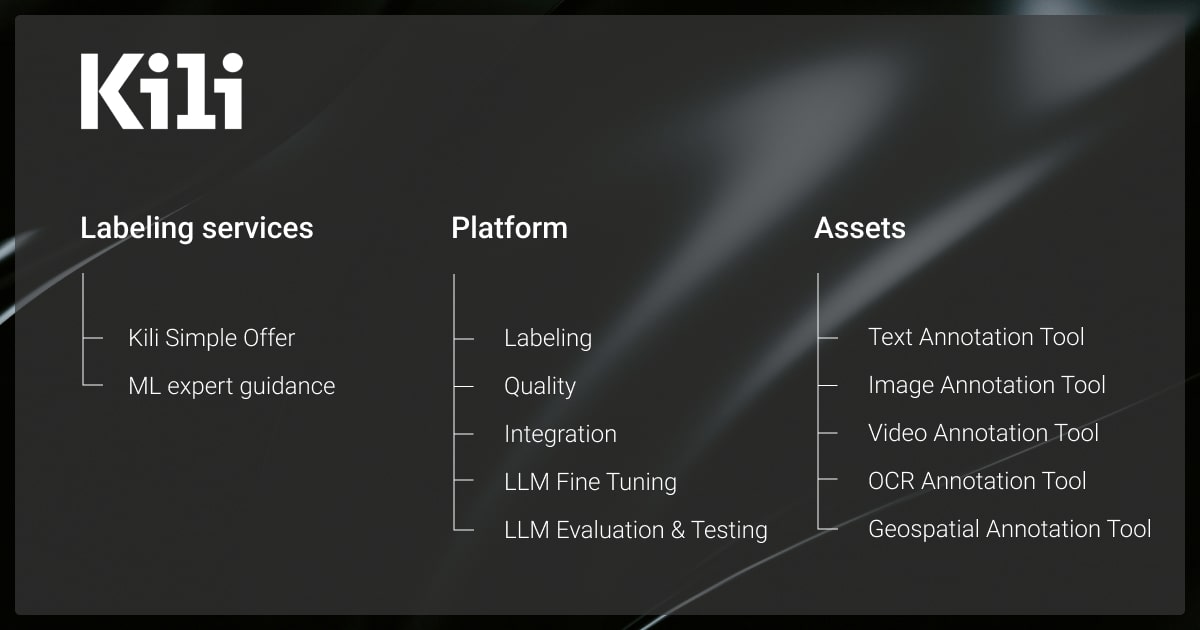
Let’s start the Kili Technology company overview with their core services and products. Kili Technology offers a comprehensive suite of data labeling solutions designed to empower businesses and data scientists in building high-quality machine learning datasets. Their offerings encompass a feature-rich data labeling platform, professional services with a global workforce of annotators, and expert guidance from Machine Learning Engineers (MLE).
Here’s a breakdown of each of their services and products:
- Kili Data Labeling Platform. The platform is a self-annotation solution that supports the labeling of text data, documents, as well as image and video data. It allows users to identify and fix inconsistencies within their ML datasets, ensuring the data used to train models is accurate. Additionally, Kili offers AI-assisted tools that complement manual labeling, ultimately boosting the efficiency of data labeling ops.
The platform’s key features include:
- Labeling tools for various data types
- Quality management functionalities
- Seamless integration capabilities
- LLM (Large Language Model) Fine-Tuning
- LLM Evaluation & Testing
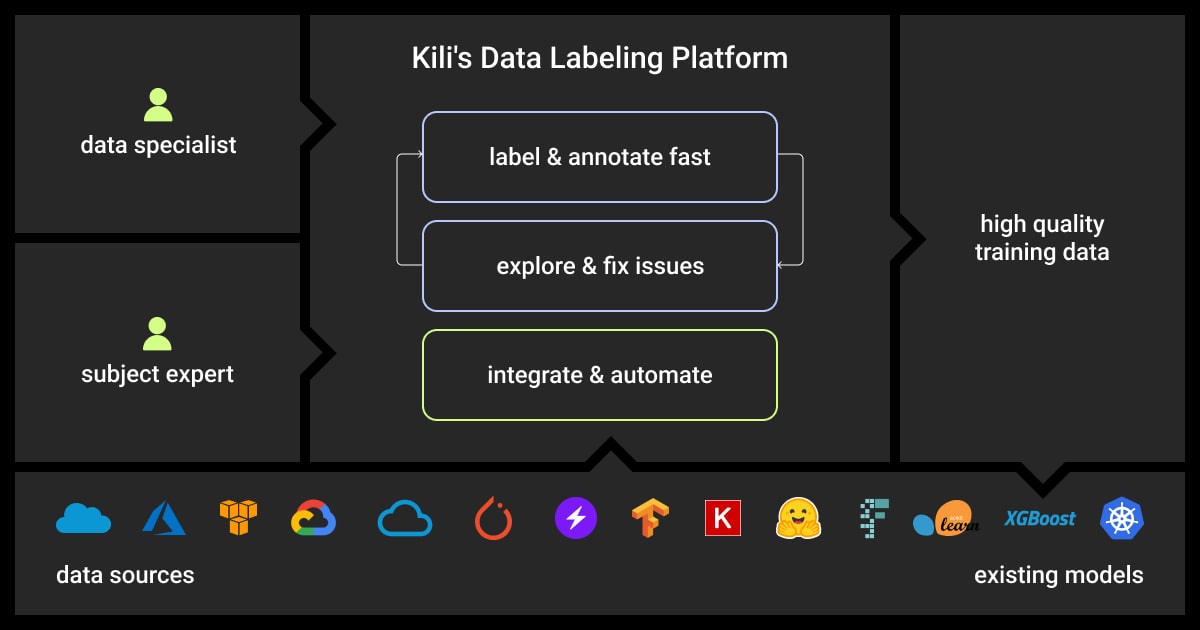
In addition to the platform, Kili offers professional services to help manage your data labeling projects:
- Kili Managed Expert Labeling Service. An expert-led data labeling service that provides you with guidance from experienced annotators to ensure high-quality datasets for your machine learning project. Kili's annotators manage the entire process, giving you control over progress and the ability to iterate for optimal results.
Their core services include:
- Kili Simple: This workforce solution provides a global network of experienced annotators equipped to handle large-scale data labeling tasks across various formats (text, documents, images, videos, satellite imagery). Their workforce boasts expertise in diverse domains and languages.
- ML Expert Guidance: Within this service, you can hire annotators to work within the Kili platform. You gain access to their API and tools for quality control, customizable annotation, and real-time project oversight. Kili offers a fully managed workforce with expertise in over 100 domains and fluency in 30 languages.
- Professional Services: These are consulting services provided by Kili’s Machine Learning Engineers (MLEs) to help assess your project’s viability, create implementation plans, and suggest best practices for labeling and global ML implementation.
- Kili’s Products. Kili has recently launched their new product, davinci, a groundbreaking AI tool powered by generative AI technology. It functions as a patent copilot, drastically accelerating patent drafting and office action response times compared to traditional methods. However, don’t get confused with a similar product named “davinci.” This is a different offering, though a Swiss law firm with that name sued Kili Technology over trademark issues.
Kili Technology Dataset Type
Kili’s platform streamlines the annotation process for various unstructured data formats. You can annotate images, videos, text documents, PDFs, satellite imagery, and even conversational data. Kili offers dedicated interfaces and features to ensure efficient and accurate labeling for different data types, including support for LLM evaluation, supervised fine-tuning, and RLHF workflows.
Moreover, Kili Technologies makes it easy to transfer your data. You can import your data for annotation and then export the annotated data to use for further analysis or to train your models. The supported formats for import are CSV, JSON, and image files (depending on the image type). For export, you can choose between the following formats: CSV, JSON, and TensorFlow Record.
However, throughout our Kili Technology review, we’ve discovered a few platform limitations:
- Video annotation: Currently, the platform supports only bounding boxes for video annotation.
- OCR integration: Text annotation in images requires users to upload their own OCR data, which may add an extra step to the workflow.
- Supported formats: The platform accepts common image formats. However, Excel and Word documents need to be transformed before import.
Kili Technology Data Annotation Tools

The platform allows you to interact with the pre-labeled data and make adjustments as needed. This ensures high-quality labels even with automation. You can even use your own custom models for pre-labeling. Besides, the Kili team uses built-in artificial intelligence models for their platform, like ChatGPT and SAM, to automatically pre-label your raw data. This can be a huge time saver, especially for large ML datasets.
The data labeling vendor offers multiple tools for different labeling needs and data types:
- Text Annotation Tool
- Image Annotation Tool
- Video Annotation Tool
- OCR Annotation Tool
- Geospatial Annotation Tool
Yet, as part of our Kili Technology overview, we’ve analyzed some drawbacks for you to consider. Kili Technology’s features that automate labeling are still under development. For complex tasks, you might still need human annotators to ensure accuracy. In addition, the vendor focuses on its own tools and may not integrate seamlessly with existing labeling tools you might be using. This could be a drawback if you prefer a more integrated workflow.
Kili Technology Integrations
Kili Technologies offers a comprehensive suite of tools to empower users in managing data quality, fostering collaboration, and seamlessly integrating the platform into existing ML workflows.
- API and Python SDK: These tools provide programmatic access to core functionalities, enabling users to manage data quality and seamlessly integrate Kili into their machine learning pipelines.
- Data Storage and Cloud Platform Integration: Kili supports major data storage solutions like Amazon S3, Google Cloud Storage, and Microsoft Azure Blob Storage. This simplifies data import and export, eliminating the need for data movement outside your preferred cloud environment. This allows users to initiate labeling tasks directly without the need for manual data transfer. Additionally, Kili facilitates version control, enabling users to track intermediary data changes and export versions directly in their preferred model format (e.g., YOLO, PASCAL VOC).
- Simplified Labeling Ops Management: Kili facilitates integration with existing machine learning stacks, datasets, and large language models (LLMs). Users can effortlessly import and export data, establish and manage labeling projects, and oversee the complete training data lifecycle within the Kili platform.
Key considerations: While Kili supports various cloud storage solutions, it’s important to note that the platform leverages webhooks, API access, and requires a Python SDK for full functionality. While these tools offer extensive control, the API might present a steeper learning curve for users without technical expertise.
Kili Technology Annotation Process
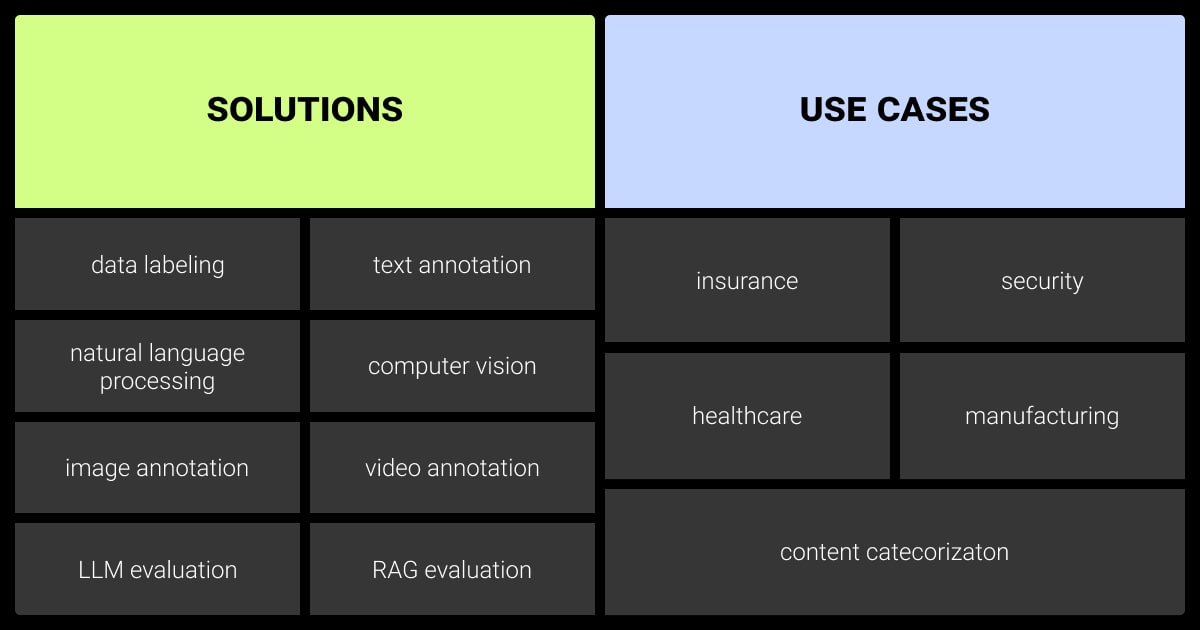
Providing a variety of services and approaches to data labeling, Kili Technology understands the critical role of annotation for any ML project. The company offers a comprehensive set of tools to streamline this process, which depends on the specific service you choose.
Platform-Based Annotation
Kili’s intuitive platform allows you to start annotating data quickly. Configurable interfaces and pre-annotation using your own models expedite the labeling process. Integrated quality metrics help identify and address errors, ensuring high-quality datasets.
Kili offers four basic labeling job types to suit your project needs: classification, object/entity detection, object/entity relation, and transcription. Here’s how it works:
- To create a training dataset, you can start by designing interfaces specific to your project requirements.
- Assign data to annotators through the platform, set validation rules, and leverage interactive segmentation and tracking tools for faster labeling. Pre-label data with your own model predictions and analyze productivity with detailed reports.
- Use advanced quality metrics to pinpoint areas requiring improvement. Reviewers can focus on critical data points and track issues at the individual object level.
- Kili offers seamless integration with popular cloud storage solutions from Amazon, Google, and Microsoft. Export data directly in your model’s format and manage access rights with predefined roles. Integrate Kili’s API and Python SDK for a smooth connection to your ML stack. Automate your MLOps infrastructure using webhooks and plugins.
Kili Simple Annotation Process
For simpler projects, Kili offers a streamlined process overseen by dedicated project managers:
- Upload data sample: You provide a sample of your dataset for labeling along with specific guidelines.
- Quote and project start: Receive a transparent quote and get your project started quickly.
- Monitor progress: You can track the progress of your dataset labeling in real-time using Kili’s advanced quality features to maintain control over the precision and quality of your data.
- Receive a fully labeled dataset: Kili promises to deliver a fully labeled dataset with a 95% accuracy guarantee. If unsatisfied, Kili offers re-annotation at no additional cost.
ML Expert Guidance
For complex projects, Kili offers an ML expert-guided data labeling process similar to Kili Simple, but with added benefits:
- Communicate project requirements: Share your expectations, quality requirements, desired level of supervision, and preferred workflows.
- Provide feedback and validate quality: Review a calibration batch, refine project guidelines and QA metrics for an iterative feedback loop.
- Monitor progress and refine annotations: You can track the annotators’ progress, check label quality, identify anomalies, and provide ongoing feedback.
- Continuous improvement with active learning: Integrate your model to fine-tune data rather than the algorithm itself. Implement active learning to continuously improve with a data-centric approach.
Kili Technology Quality Assurance (QA)
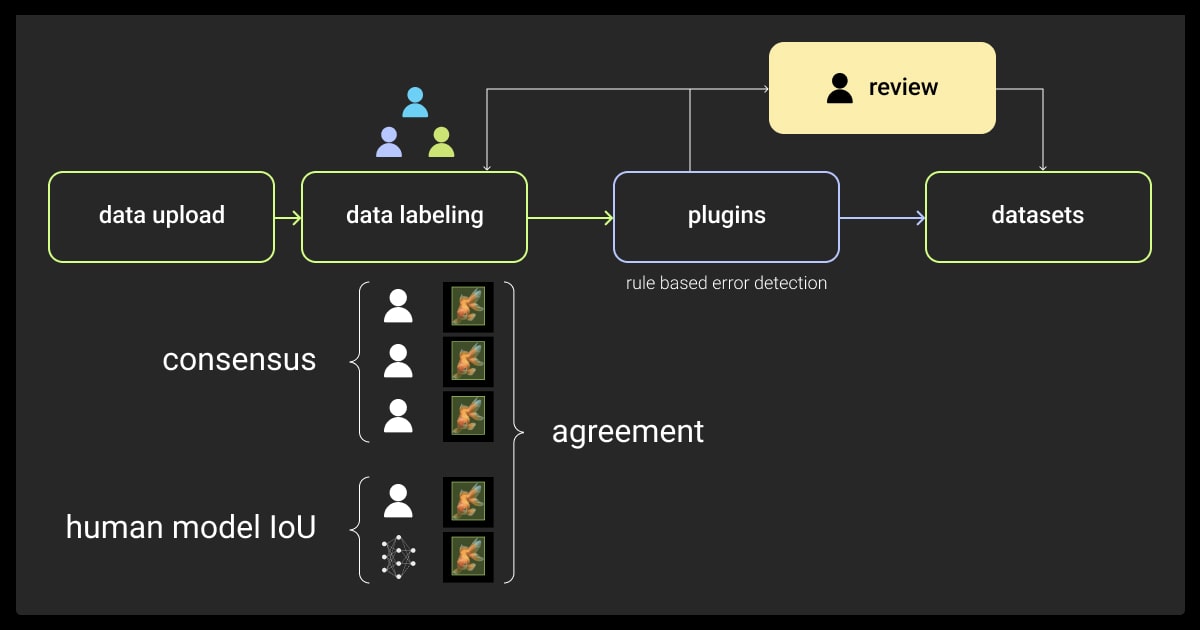
Ensuring the quality of annotations is crucial for the success of any data annotation project. Kili Technologies offers several tools to enhance quality management, including:
- Annotation consistency checks: Kili reviews annotation consistency across multiple annotators through automated checks. This helps identify discrepancies and resolve any potential conflicts.
- Review and feedback: With Kili Technologies, you can review annotations made by your team members and provide feedback for improvement. This iterative feedback loop helps maintain high-quality annotations.
- Quality control metrics: Kili Technologies generates quality control metrics, such as inter-annotator agreement and annotation speed, to assess the performance of annotators and identify areas for improvement.
The Kili team guarantees 95% accuracy based on your specific requirements. Their professional labeling services cover the following approaches to data labeling quality:
- Low-error datasets: Ensure your datasets are reliable and representative.
- Data cleaning: Address quality, bias, or imbalance issues in existing data.
- Programmatic QA: They apply programmatic QA and active learning to maintain high quality as your data volume grows. It also allows automating error identification with custom QA scripts directly within the labeling interface. You can also use pre-built models to automatically find and fix issues in your datasets.
Kili offers several options for managing annotation quality within their platform. Here are their recommendations for optimal results:
- Continuous feedback: Collaborate with your team through ongoing feedback mechanisms.
- Targeted reviews: Combine random and specific data reviews for a comprehensive quality check.
- Quality metrics integration: Track key metrics to monitor progress and identify areas for improvement.
- Programmatic QA: Implement automated error detection for added efficiency.
Kili Technology Pricing
Kili Technology offers a tiered pricing structure to meet the specific needs of your AI projects. And we made sure to include a breakdown of their pricing plans into this Kili Technology company review:
Free Plan:
- Ideal for getting started with data labeling.
- Simply create an account and start labeling your data (text, image, video, PDFs, etc.).
- Limited to 5,000 annotations and 5 collaborators.
Grow Plan:
- Perfect for streamlining annotation workflows for models in production.
- Pay-as-you-go pricing based on your usage.
- Access to all advanced features with no usage limits.
Enterprise Plan:
- Designed for corporations with strict data security and contractual requirements.
- Includes enterprise-grade data protection and custom contracts.
Professional Services (Add-on)
Kili Technology provides expert services to enhance your data labeling process. These services can be added to any plan. In the context of an ML Expert Guidance service, you can hire annotators within the Kili platform for $6-$60 per hour (price depends on project specifics).
For more specific pricing, you can get a quote for customizable annotation on their website based on the size and complexity of your ML dataset.
Kili Technology Security and Data Compliance
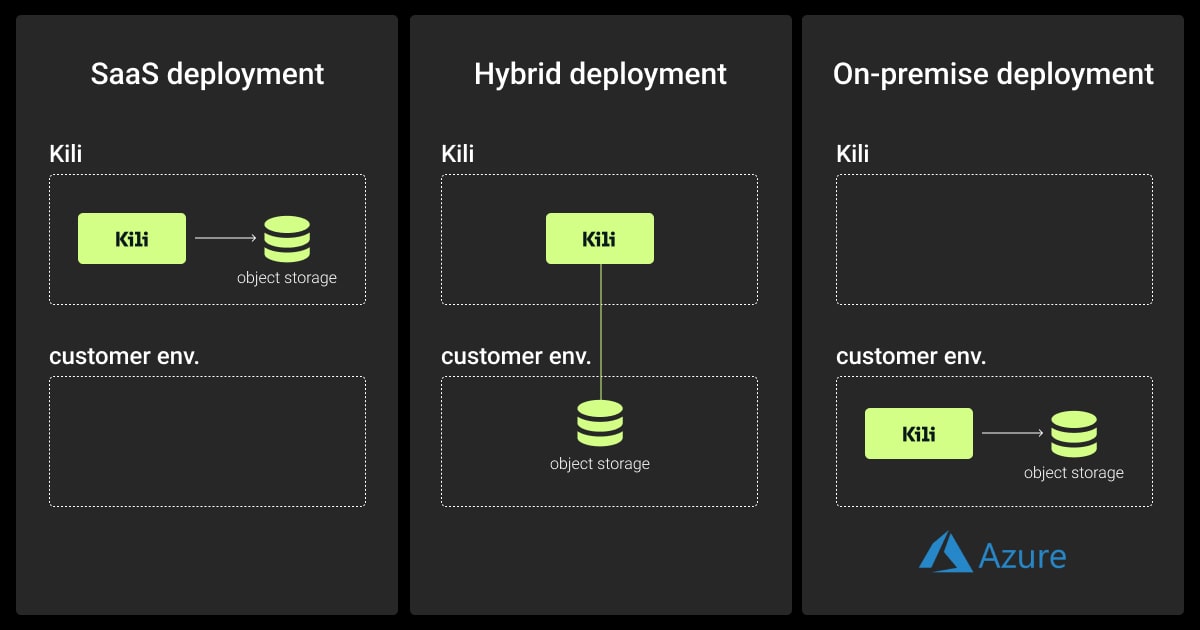
The final yet most crucial factor in this Kili Technology review is, of course, data security and compliance. As a reputable data labeling company, Kili Technology offers security measures to protect user data. These measures include adherence to industry security standards such as ISO 27001:2013, SOC 2 Type II, and HIPAA compliance.
Top Kili Technology Alternatives
Once you’ve finished this Kili Technology company review, you might be interested in exploring some other data labeling companies on the market. Here are 3 alternatives to consider:
Label Your Data
Our Label Your Data team empowers data scientists and project managers with high-quality labeled data for your ML projects, accelerating model training. With a big global team, we can tackle both computer vision and NLP tasks. We offer a free pilot, flexible pricing, and tool-agnostic teams. In addition, you can rest assured that your data is in safe hands as we prioritize security with top industry certifications (PCI DSS Level 1, ISO 27001, GDPR, and CCPA).
iMerit
iMerit provides data labeling for computer vision and NLP tasks, as well as generative AI training data solutions and content services. The company tackles data challenges for AI projects across various sectors, from self-driving cars to healthcare. With a global presence and a commitment to data security compliance, iMerit offers a comprehensive solution for businesses seeking to leverage AI effectively. Read more about the vendor in our iMerit company review.
CloudFactory
CloudFactory is a company that provides human-in-the-loop (HITL) data labeling solutions for machine learning projects. They use a global workforce and AI-powered technology to label data for tasks like image and video classification, object detection, and sentiment analysis. CloudFactory offers a secure platform and adheres to industry data compliance standards. Learn more in our detailed CloudFactory review.
About Label Your Data
If you choose to delegate data annotation, run a free data pilot with Label Your Data. Our outsourcing strategy has helped many companies scale their ML projects. Here’s why:
Check our performance based on a free trial
Pay per labeled object or per annotation hour
Working with every annotation tool, even your custom tools
Work with a data-certified vendor: PCI DSS Level 1, ISO:2700, GDPR, CCPA
FAQ
How does Kili Technology compare to other data labeling platforms in terms of pricing and features?
Kili Technology has a tiered pricing structure (Free, Grow, Enterprise) but doesn't provide a detailed cost. While the article explores Kili Technology's features and services, we can’t provide a head-to-head comparison on pricing and features with other data labeling platforms. To get a complete picture, you might need to check Kili Technology’s website or contact the vendor directly.
Does Kili Technology offer any pre-annotation features to speed up the labeling process?
Yes, Kili Technology offers the following features to speed up labeling:
- Pre-annotation using your own models: You can upload your models to pre-label data, potentially saving time on manual labeling.
- Built-in AI models (ChatGPT, SAM): Kili uses built-in AI models to automatically pre-label raw data, further reducing manual effort.
Are there any user reviews mentioning integration difficulties with other machine learning tools?
There are some limitations regarding integrations. First, Kili relies on its API and Python SDK for full functionality, which might be challenging for users without technical expertise. Second, their platform might not seamlessly integrate with existing labeling tools you already use. We also recommend exploring user reviews on other platforms to see if integration issues are a common complaint.
Written by
Karyna is the CEO of Label Your Data, a company specializing in data labeling solutions for machine learning projects. With a strong background in machine learning, she frequently collaborates with editors to share her expertise through articles, whitepapers, and presentations.

